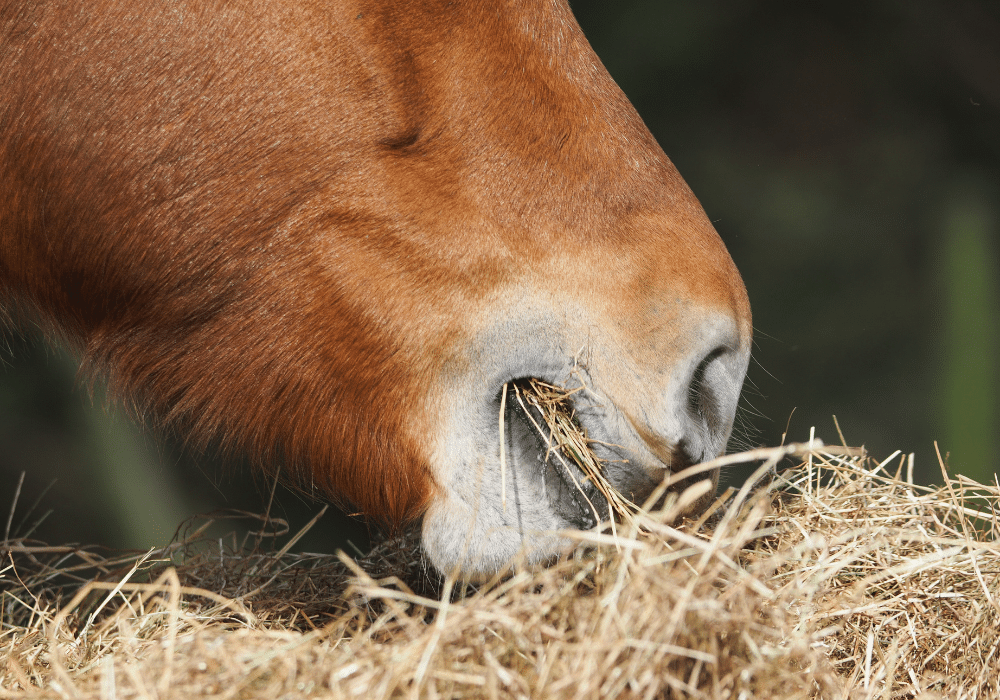Colic is a broad term referring to abdominal pain. Impaction colic is a specific type of colic, where a dried mass of food or other material accumulates in the gastrointestinal tract (GIT), causing a blockage. This guide outlines the causes and symptoms of impaction colic, how to prevent it and what to do if you suspect impaction colic.
Symptoms of Impaction Colic
Early symptoms of impaction colic tend to precede the usual tell-tale signs of colic. Reduced faecal output (fewer and / or smaller droppings), reduced appetite and dry droppings can all be early warning signs of impaction colic.
The horse may also display the typical symptoms of colic: pawing the ground, rolling, flank watching and sweating.
What to do if You Suspect Impaction Colic
Colic is a veterinary emergency, and you should always call your vet immediately if you suspect any form of colic. Early detection and treatment are essential to achieving a good outcome.
Your vet may perform a rectal examination – in cases of impaction colic, this can help the vet to detect where in the GIT the impaction is, as well as how serious it is. Pain relief may be administered, which can help the horse relax as well as reducing pain and discomfort and helping to alleviate colic symptoms. Depending on the severity of the impaction, this nasogastric intubation may need to be repeated several times and intravenous fluids (a drip) may also be required
Impaction colic is often treated by inserting a tube via the horse’s nose and into its stomach (this is called nasogastric intubation). Water and electrolytes given down this tube are used to soften the impaction, helping it to pass through the horse’s system.
Causes of Impaction Colic
Changes to diet, workload or turnout can all trigger episodes of colic. When it comes to impaction colic specifically, changes to a horse’s management in the colder months are often the trigger. Hence, impaction colic is sometimes known as “winter colic”.
Dehydration is a major contributor to impaction colic. Horses are less inclined to drink when it’s cold, and frozen buckets or water troughs restrict the availability of water. Furthermore, horses tend to consume less grass and more hay during the winter. Hay has a far lower water content than grass, which can contribute to dehydration.
Reduced activity can also increase the risk of impaction colic. Horses are designed to graze for most of the day, and this keeps both their bodies and their gut moving. Many horses are in reduced work over the winter, and they may also have less access to turnout. Bored horses may also eat their bedding (especially straw), which increases the risk of impaction colic.
Preventing Impaction Colic
Whilst impaction colic can usually be treated if diagnosed early, preventing it is far better for your horse’s welfare.
24/7 access to fresh, clean water is essential – be sure to check water buckets, troughs and automatic drinkers regularly and deal with any leaks or ice. Prepare for the colder weather by insulating pipes and providing and alternative source of water. A tennis ball in the water trough can help to prevent it freezing solid.
Soaking hay and adding water to feeds can also help to increase water intake, but be careful with soaked hay when the temperature drops below freezing as frozen hay can be a trigger for a different type of colic – spasmodic colic!
Finally, maintaining a suitable exercise and turnout routine can also help reduce the risk of impaction colic. This will keep your horse’s gut moving, which will help reduce the chance of a blockage. It can also help to minimise boredom.
Avonvale Equine Vet Practice | Independent Equine Vet Clinic
Avonvale Equine Vet Practice are available 24/7, 365 days of the year for emergency call-outs, including for cases of colic. Our emergency call-outs are covered by our own vets, so you will always see an Avonvale vet no matter what time of day or night you require us. Our Ratley clinic is equipped with full surgical facilities, enabling us to carry out emergency colic surgery. Furthermore, our in-patient facilities are managed by our experienced equine veterinary nursing team, so your horse is in safe hands should they need to stay with us overnight. Register your horse, pony, donkey or mule with us today.








